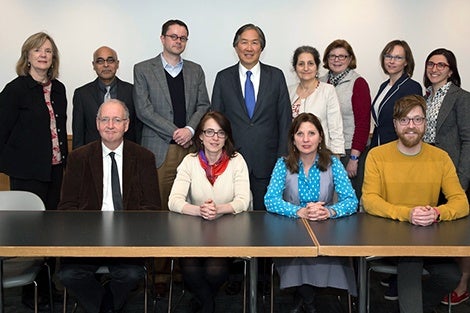May 10, 2017 — Every company, be it a cruise line or clothing manufacturer, has the potential to improve health through its products and practices. Researchers at Harvard T.H. Chan School of Public Health and Harvard Business School (HBS) want to encourage business leaders to prioritize the protection and promotion of health and wellbeing. To understand how some companies are already contributing to health—and how to encourage others to do so—they’ve launched a program called A Culture of Health (COH): A Business Leadership Imperative.
The three-year program includes six sub-projects focused on research, convening of leaders, and training to build a COH in the U.S. business community. The program, newly funded by a $4.7 million dollar grant from the Robert Wood Johnson Foundation (RWJF), represents the culmination of an intensive year-long planning process, also funded by RWJF.
The program brings together 18 faculty members and their teams from Harvard Chan School and HBS. Howard Koh, the Harvey V. Fineberg Professor of the Practice of Public Health Leadership at Harvard Chan School, is principal investigator. Co-principal investigators are Harvard Chan School’s John McDonough, professor of the practice of public health, Sara Singer, professor of health care management and policy, and John Quelch, who holds dual appointments as the Charles Edward Wilson Professor of Business Administration at HBS and professor of health policy and management at Harvard Chan School.
Good health can be good for business
Quelch frames a COH around four pillars: consumer health, employee health, community health, and environmental health. In the preface to his recent book Building A Culture of Health, Quelch writes, “A company that incorporates a culture of health in its mission and daily decision-making will not only seek to make its net impact on public health as positive as possible, but will also create business opportunities for itself in doing so.”
As an example, in 2014 the pharmacy chain CVS demonstrated a commitment to a culture of health when it stopped selling tobacco products and rebranded itself as CVS Health. The company’s new positioning led to improved revenues from increased primary health care service offerings. According to Forbes, these increased revenues helped offset the loss of tobacco revenues.
Given that COH is an embryonic area of academic research, the Harvard Chan/HBS program will focus on identifying and learning from leaders and companies that are already engaged in COH practices, developing standardized metrics for a COH, and building bridges between the worlds of private business and public health. In April 2016, the team held an invitation-only conference to kick off the program. In March 2017, they also piloted some potential executive education curricula to the fellows of the Harvard Advanced Leadership Initiative—a University–wide program in which experienced leaders learn to apply their business acumen to addressing complex social problems.
“Participants responded positively,” said COH Program Manager Leila Roumani. “They asked rigorous questions, such as how to integrate health metrics into existing business metrics, and how to measure return on investment.”
Building on these events, the program will identify the qualities and environmental factors that motivate some business leaders and communities to make investments in a COH. Businesses and their leaders at the cutting edge of this work will be featured in a publicly available webcast video series. The program will also develop executive education programs to aid companies in promoting a culture of health.
Koh looks forward to tackling these and many other questions through the COH program. “We hope the creativity, commitment, and collaboration of our two Schools can result in a healthier nation,” he said.
Learn more
Helping businesses do good for people and the planet (Harvard Chan School news)
Building bridges between public health and business (Harvard Chan School news)
Photo: Sarah Sholes
